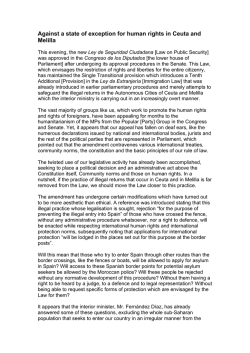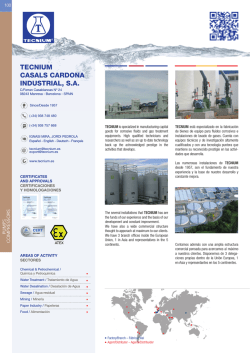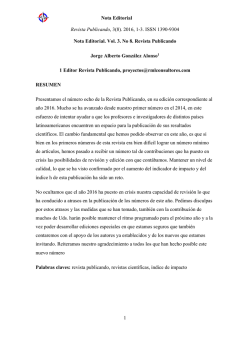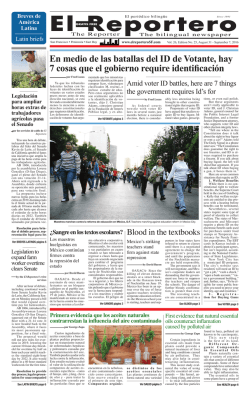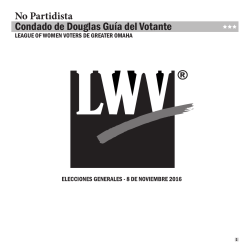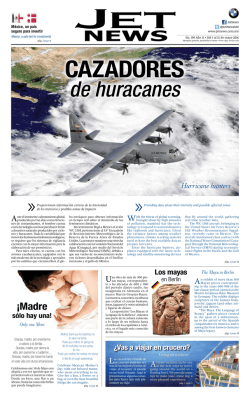
intervencion de se michelle bachelet presidenta de la republica de
Cotejar con texto leído INTERVENCION DE S.E. MICHELLE BACHELET PRESIDENTA DE LA REPUBLICA DE CHILE Debate General Septuagésimo período de sesiones de la Asamblea General Nueva York, 28 de septiembre del 2015 Check against delivery STATEMENT BY H.E. MICHELLE BACHELET PRESIDENT OF THE REPUBLIC OF CHILE General Debate Seventieth session of the General Assembly New York, 28 September 2015 Permanent Mission of Chile to the United Nations 3 Señoras y señores: El mundo de hoy enfrenta grandes desafíos y tareas. Asistimos a un conjunto de graves crisis internacionales en varias zonas del mundo que han afectado la paz y la seguridad internacional, especialmente en el Medio Oriente, pero también en Europa y África, afectando especialmente a grandes poblaciones civiles que huyen desesperados para salvar sus vidas y forjar un destino mejor. Como comunidad internacional tenemos la obligación de reaccionar solidariamente para restablecer la paz y dar una respuesta que nos permita minimizar el sufrimiento de las víctimas de la guerra y de los que escapan de ella. Valoramos los esfuerzos que están haciendo muchos países para acoger a los refugiados, pero debemos hacer más. Es por eso que mi Gobierno ha decidido acoger a refugiados de la Guerra civil en Siria. Y es por eso también que Chile fortalecerá la cooperación con África, región donde a partir del año 2016 participaremos en las operaciones de paz de las Naciones Unidas. Junto con enfrentar los desafíos más urgentes de la paz, nuestro planeta aún no logra reducir el aumento de la desigualdad, ni alcanzar un acuerdo para detener el calentamiento global. Es por eso que, en este marco de graves desafíos internacionales, esta Septuagésima Asamblea General pasará a la historia como un momento importante en que la comunidad internacional ha logrado construir un acuerdo en torno a la Agenda para el Desarrollo hasta el año 2030. Esta agenda es esperanzadora y nos compromete. Pone en su centro el enfrentamiento de diversos rostros de la desigualad, aquello que es el principal desafío de América Latina, y por cierto de Chile, en esta nueva fase de nuestro desarrollo económico y político. Se trata de una Agenda amplia y ambiciosa, pero acorde con los desafíos urgentes y con los objetivos de largo plazo de una convivencia humana justa, creativa, y pacífica. No ignora los compromisos aún pendientes, pero incorpora nuevos objetivos y metas, integrándolos en un sentido multidimensional en la idea de Desarrollo sostenible e inclusivo. Se trata de una agenda de cambios. Esta es una mirada que compartimos y apoyamos con entusiasmo. La igualdad dentro y entre los países; entre los géneros; el crecimiento, la industrialización y el consumo inclusivo y sostenible, el cuidado del medio ambiente en sus distintas facetas, la paz social, por nombrar sólo algunos objetivos de la Agenda, son el rostro y la base de un modo de convivencia basado en valores muy profundos. Tenemos una oportunidad para enfrentar los signos de desesperanza frente al futuro y de desconfianza frente a las instituciones que recorren algunas de nuestras sociedades. La primera responsabilidad por un desarrollo sostenible y con una mayor igualdad recae en cada uno de nuestros países. Y Chile se compromete con entusiasmo en esta tarea. Sin embargo, este empeño requiere de un entorno favorable, pues gran parte de las metas están afectadas por dinámicas globales, y ya que muchos de los desafíos que enfrentamos no pueden ser resueltos de manera aislada por cada país. Promover sociedades más inclusivas y sostenibles sólo será posible si somos capaces de llevar adelante una agenda de cambios a nivel nacional, pero también global. 4 Cuando el comercio internacional no es un motor para el crecimiento; si los flujos financieros son asimétricos, mínimos y volátiles; si no existen mecanismos justos y eficaces para la resolución de la deuda soberana; si no existen corrientes predecibles y suficientes de ayuda oficial para el desarrollo, los países emergentes, y con mayor razón los países más pobres enfrentarán grandes obstáculos en el cumplimiento de los objetivos de la Agenda. De igual forma, es preciso que los sistemas financiero, monetario y comercial internacionales funcionen más democráticamente, con efectividad y con equidad frente a los intereses de los países en desarrollo, lo que no es siempre el caso en la actualidad. Por eso, una condición básica para hacer realidad la Agenda es fortalecer el marco de las instituciones globales y de la cooperación multilateral, con representación amplia, mandatos claros y herramientas eficaces. Promovemos una arquitectura de las instituciones multilaterales que sirva de soporte a las políticas nacionales que propone la Agenda 2030. Chile es un país que ha intensificado su papel en el sistema multilateral. En 2014 y 2015, hemos sido un miembro no permanente del Consejo de Seguridad. A la luz de esta última experiencia, queremos reafirmar nuestra convicción sobre la necesidad de reformar el Consejo, ampliando el número de sus miembros permanentes y limitando el veto, al menos, cuando se trate de crímenes de lesa humanidad. Es una reforma necesaria, en línea con lo mucho que ha avanzado el sistema multilateral y que, sin duda, le otorgaría mayor legitimidad al órgano más importante de Naciones Unidas. Nuestro país es consciente de la responsabilidad que todos tenemos de velar por el buen funcionamiento del sistema internacional. Un elemento esencial es el principio del apego al derecho internacional, que incluye el estricto respeto a los tratados, como una garantía de la paz y estabilidad internacional. Ello requiere respetar lo pactado, así como no hacer un uso indebido de los mecanismos que hemos diseñado para resolver pacíficamente las diferencias que realmente pudiesen existir. Chile, desde el extremo austral de América, mira con esperanza lo que ocurrirá en la COP21 en París. Tenemos una de las costas más largas del mundo. Pronto celebraremos en nuestro país la segunda Conferencia Our Ocean - Nuestro Océano, para buscar que los países asumamos compromisos voluntarios para disminuir la polución de los mares, controlar la pesca ilegal y cuidar la diversidad de los recursos marinos. En cuanto a la Contribución Nacionalmente Determinada, mi país se compromete a reducir de aquí al 2030 sus emisiones de CO2 en un 30% y en hasta un 45% si contamos con el apoyo internacional. Además nos comprometemos a recuperar 100 mil hectáreas de bosques y a reforestar 100 mil adicionales. La Agenda 2030 nos ofrece un horizonte compartido, ahora nos toca actuar. Cada uno en su país, pero también cooperando unos con otros en los diferentes espacios Norte-Sur y Sur-Sur, y abordando los desafíos globales de manera conjunta en los espacios multilaterales. Quiero concluir estas palabras felicitando a dos gobiernos que han restablecido relaciones diplomáticas. Me refiero a Cuba y Estados Unidos. Es un paso histórico. Chile alienta los caminos del 5 diálogo y del respeto del Derecho Internacional como la forma civilizada en que los países deben resolver sus diferencias. Los últimos acuerdos entre el gobierno de Colombia y las FARC también son una muestra que con voluntad hay posibilidad de llegar a un acuerdo. Colombia y su pueblo cuentan con nuestro acompañamiento activo en este proceso, que confiamos los llevará a una paz duradera. Tenemos motivos para estar orgullosos de nuestros logros comunes, y a la vez para estar preocupados y atentos sobre nuestro futuro. Pero tenemos razones para la esperanza. Estos sentimientos deben guiar nuestra acción y nuestro compromiso para construir un mundo mejor. Con mayor equilibrio entre el desarrollo y la conservación de nuestro medio ambiente; con mayor justicia, cohesión e igualdad en nuestras sociedades y entre nuestros pueblos. Muchas gracias. ++++ 6 Ladies and gentlemen, The world today is facing big challenges and tasks. We are witnessing a conjunction of serious international crises in various parts of the world that have impacted international peace and security, notably in the Middle East but also in Europe and Africa, especially affecting large civilian populations which, in desperation, are fleeing in order to save their lives and forge a better future. As an international community, we are duty-bound to react with solidarity in order to restore peace and provide a response that will enable us to minimize the suffering of the victims of war and those who are running away from it. We appreciate the efforts many countries are making to take in the refugees, but we must do more. This is why my Government has decided to take in refugees from the civil war in Syria and it is also why Chile will expand cooperation with Africa. Starting in 2016, we will be participating in United Nations peacekeeping operations in that region. In addition to tackling the most urgent challenges to peace, our planet has yet to stem the growing inequality and reach an agreement in order to halt global warming. For this reason, in this context of serious international challenges, this seventieth session of the General Assembly will go down in history as an important moment at which the international community succeeded in forging an agreement regarding the 2030 Agenda for Sustainable Development. This is a promising and a binding agenda. It focuses on addressing various aspects of inequality, which is the main challenge in Latin America and of course in Chile, in this new phase of our economic and political development. The Agenda is broad and ambitious, and it is in keeping with the pressing challenges and the long-term goals of fair, creative and peaceful human coexistence. It does not overlook the commitments that are still pending, but incorporates new goals and targets, integrating them multidimensionally into the idea of sustainable development and inclusive. It is also an agenda of change. This is an approach which we share and enthusiastically support. Equality within and among countries; between men and women; growth, industrialization and inclusive and sustainable consumption, protection of the environment in its various facets, social peace--to name but a few of the Agenda’s goals—these are the face and the foundation of a mode of coexistence based on very profound values. We have an opportunity to address the signs of despair about the future and of lack of trust in institutions that permeate some of our societies. Primary responsibility for sustainable and more equal development rests with each individual country. Chile is enthusiastically committed to this task. However, this endeavor requires a favourable environment, since many of the targets are affected by global dynamics and most of the 7 challenges that we face today cannot be resolved by each country in isolation. Only if we can carry out an agenda of change at the global, as well as, the national level will it be possible to promote more inclusive and sustainable societies. When international trade is not an engine of growth; if financial flows are asymmetrical, minimal and volatile; if there are no fair and effective mechanisms for dealing with sovereign debt; if there are not enough predictable flows of official development assistance, emerging countries--and especially the poorer ones--will have great difficulty attaining the goals of the Agenda. Similarly, international financial, monetary and trading systems must operate more democratically, effectively and fairly in relation to the interests of the developing countries; currently that is not always the case. Consequently, a basic prerequisite for making the Agenda a reality is to strengthen the system of global institutions and multilateral cooperation, with broad representation, clear mandates and effective tools. We are calling for an architecture of multilateral institutions that will provide backing for the national policies proposed by Agenda 2030. Chile is a country that has strengthened its role in the multilateral system. In 2014 and 2015, we have been a non-permanent member of the Security Council. In light of this experience, we wish to reaffirm our belief in the need to reform the Council by increasing the number of its permanent members and reducing the veto, at least in cases of crimes against humanity. Such a reform is necessary, reflecting the considerable progress made in the multilateral system, and would undoubtedly confer greater legitimacy on the most important organ of the United Nations. We realize that we are all responsible for ensuring that the international system works properly. One essential element is the principle of adherence to international law, which includes strict respect for treaties as a means of guaranteeing peace and international stability. This requires respecting what has been agreed on and to not misuse the mechanisms that have been designed for pacifically resolving any differences that may exist. From the southernmost tip of the American continent, Chile is looking forward, full of hope, to the outcome of COP21 in Paris. We have one of the longest coastlines in the world. We will soon be hosting the second Our Ocean conference, at which countries will be asked to make voluntary commitments to reduce pollution of the seas, combat illegal fishing and protect the diversity of marine resources. My country has recently agreed Intended Nationally Determined Contribution, which consists in our commitment to reduce, by 2030, our CO2 emissions in 30% and up to 45% if we count with international support. Even more, we are determined to recuperate 100 thousand acres of forest and reforest an additional 100 thousand more. Agenda 2030 gives us a shared horizon; now we must act. Each country must act individually but at the same time must cooperate with the others in the various North-South and South-South forums and must tackle global challenges jointly in the multilateral forums. 8 I should like to conclude by congratulating two Governments which have resumed diplomatic relations--namely Cuba and the United States. This is a historic step. Chile applauds the use of dialogue and respect for international law as the civilized way for countries to resolve their differences. The recent agreements between the Government of Colombia and the Revolutionary Armed Forces of Colombia (FARC) are also proof that where there is a will there is a way to come to an agreement. Colombia and its people can count on our active support in this process which we are confident will lead to a lasting peace. We have reason to be proud of our joint achievements, and also to be concerned about and attentive to our future. But there are grounds for hope. These sentiments should guide our action and our commitment to build a better world—one in which there is better balance between development and preservation of our environment; more justice, cohesion and equality in our societies and among our peoples. Thank you. ++++
© Copyright 2026
